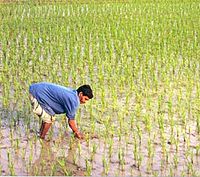
Photo from wikipedia
Biochar as a soil amendment recently take special attention for ameliorating salt-affected soils, whereas it can be an agriculturally important resource for increasing soil fertility and productivity through the ameliorating… Click to show full abstract
Biochar as a soil amendment recently take special attention for ameliorating salt-affected soils, whereas it can be an agriculturally important resource for increasing soil fertility and productivity through the ameliorating of salt-affected soils. The experimental field was conducted in 2013–2014 and 2014–2015 growing season for maize in saline–sodic soil at Agricultural Faculty Farm, Tanta University. The objectives of this study were (i) to study the reclamation effectiveness of wood sawdust (BW) and maize stalk biochars (BM) at rates of 5, 10, and 19 ton ha−1 on amelioration of a saline sodic soil; (ii) evaluation of the response of maize (Zea mays L.) crop and plant nutrients uptake to different treatments; and (iii) monitoring of the gradual improvement in saline sodic soil chemical properties. The results indicated that biochar application significantly increased soil organic matter (SOM), microbial biomass (C), cation exchange capacity (CEC), exchangeable cations, available phosphorus concentration, fertility index but decreased electrical conductivity (EC), and exchangeable sodium percentage (ESP) of the studied soil. The treatment of 19 ton ha−1 of wood sawdust biochar showed the highest decreases in EC by 62.0%, ESP by 74.5%, and exchangeable Na by 67.4% relative to the control. The highest significant increase in the uptake of NPK, grain, and straw yield of maize plants and soil fertility index corresponded to the 19 ton ha−1 wood sawdust biochar treatment. Our results indicate that biochar can ameliorate saline–sodic soils and improve soil fertility.
Journal Title: Arabian Journal of Geosciences
Year Published: 2019
Link to full text (if available)
Share on Social Media: Sign Up to like & get
recommendations!